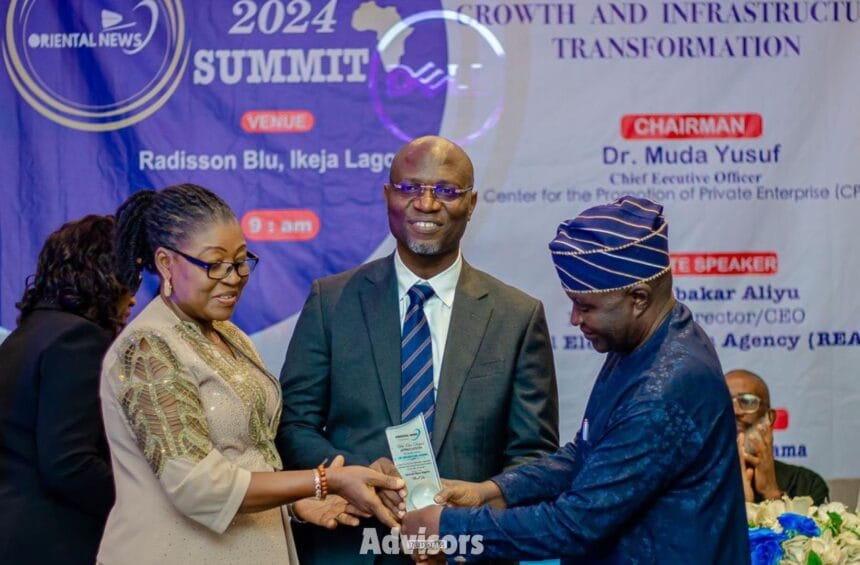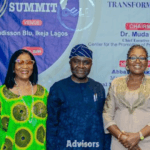Dr. Emomotimi Agama, Director General of the Securities and Exchange Commission, (SEC) has announced the plan to launch the Commission’s third green bond in September 2024, as part of a strategic move aims to funnel essential funds into the renewable energy sector and other green projects and fostering an eco-friendly future in Nigeria.
According to Dr. Agama, this initiative is part of the diverse green economy strategies that Nigeria can adopt to address the myriads of socio-economic problems facing the country.
He emphasized that all Nigerians, including the government and private sector, must embrace this approach to achieve sustainable development.
The DG of the SEC made this known while speaking on the theme: “Green Economy, Sustainable Growth and Infrastructure Transformations,” at The Oriental News 2024 Summit, held in Lagos on Thursday.
Advisors Reports gathered that Nigeria issued its first sovereign green bond in December 2017, valued at NGN 10.69 billion, a second green bond was launched in June 2019, valued at NGN 15 billion and oversubscribed by 220%, bringing the total to NGN 25.69 billion, aimed at renewable energy, afforestation, and climate adaptation initiatives.
The SEC DG in his presentation on Thursday said, “Nigerians have to show major interest in issues dealing with climate change and activities that affect every facet of our living.
“The six political zones have specific climate issues that are different from one area to another. Policy and strategy for Nigeria on sustainability are crucial,” Agama noted.
“The backbone for a subject matter is the policy and strategy that we need to develop the green economy. The green economy speaks to nature, and there can’t be any economy that speaks to nature more than Nigeria because every part of the country has something extraordinary.
“We are numerous endowed—deserts, marine, and farms that speak to our uniqueness,” he added.
Dr. Agama, while highlighting the immense potential of Nigeria’s lithium deposits, which are a crucial component of solar energy solutions, noted that lithium is abundantly found across seven states in Nigeria, and the country has only just begun to tap into this resource.
The DG stated that with the intense heat in the northern regions of Nigeria, the current power generation is insufficient without relying on the national grid.
He proposed the establishment of solar energy estates in the Northern region, which according to him, would not only contribute more energy to the national grid but also support industrial areas where machines could operate around the clock, thus creating employment opportunities from various angles.
Dr. Agama lamented that the University of Benin has a monthly energy bill of N341 million, similarly, Ahmadu Bello University incurs a monthly energy bill of N450 million.
He applauded the recently rated Rural Electrification Agency (REA), Energizing Education Programme Phase II.
He stressed the importance of recognizing the employment opportunities that renewable energy projects could create and the necessity of retraining individuals to develop skills in these new fields.
According to him, the Rural Electrification Agency (REA) should focus on organising more training programmes across Nigeria to generate 52,000 direct jobs.
Expressing his aspirations, Dr. Agama shared his dream of establishing a solar battery factory utilizing Nigeria’s lithium resources upon his retirement.
He emphasized the need for investors across Nigeria to embrace such renewable energy initiatives to improve public health by reducing asthma and other respiratory issues caused by generator-smokes, while also promoting a cleaner and quieter environment.
“The widespread use of generators in Nigeria has led to numerous fatalities due to carbon monoxide poisoning.
“The noise pollution in Lagos, largely from mechanical generators, would diminish with the aggressive adoption of renewable energy sources,” Dr. Agama mentioned.
He further emphasized that Nigeria possesses abundant natural resources such as wind in coastal cities in the South region, solar energy in the Northeast and West, and hydropower in the North Central region, all of which can be harnessed for power generation.
“By doing so, the country can reduce the cost of commodities influenced by the high cost of generator power, thereby benefiting small and medium-scale enterprises,” the DG said.
Dr. Agama also highlighted the demographic advantage of Nigeria’s youth population.
He argued that up to 80 percent of the youth could be encouraged to join the renewable energy sector, thereby driving the green economy and contributing to the country’s sustainable development.
He lamented that Nigeria has neglected an economy that could sustain it, highlighting the need to solve foundational problems through a green economy.
“We need to reduce carbon emissions and conserve biodiversity. Every Lagosian who grew up in the state is a major victim of biodiversity loss, which has affected the fish in our rivers. Now, we eat frozen fish,” Agama remarked.
Agama also emphasized the importance of addressing pollution and non-degradable plastics that harm marine life.
He highlighted the benefits of diversifying the economy away from oil and gas, and transitioning to a green economy, which according to him, can reduce environmental impact and enhance resilience against global oil price volatility.
The SEC DG called for environmental sustainability, addressing challenges such as water pollution, soil degradation, and deforestation.
According to him, Nigeria faces significant environmental challenges, including water pollution, soil degradation, and deforestation.
“From Wailo Bauchi to Maiduguri, we can count the number of trees, highlighting the extent of total deforestation. We need to revisit the principle of planting one tree per day,” he stated.
He emphasized that one of the greatest trees in Nigeria is the Neem tree (Dongoyaro). Importantly, the byproducts of this tree help in the treatment of malaria and fever.
“We have the solutions without making use of them,” he lamented.
Dr. Agama highlighted the concept of the Green Economy, which involves turning everything around us into monetary value by using the environment to change our course.
He explained that the Green Economy is essential for our benefit under the principles of Environmental, Social, and Governance (ESG).
“It provides financial benefits, sustains our lives, guarantees life expectancy, and reduces emission intensity,” he concluded.
The Director-General of the SEC stated, “The present administration is committed to achieving 30 percent of total electricity generation by 2060 in Nigeria from renewable energy sources, according to the Energy Commission of Nigeria.”
Dr. Emomotimi Agama emphasized the need for Nigerians to confront the upfront costs associated with acquiring solar energy equipment. He acknowledged that while these costs can be high, they will decrease as more Nigerians adopt these technologies and as improvements are made.
“I urge you not to focus on the initial cost,” he said. “You need to plan towards it. Some banks are offering financial instruments and funding for their customers to acquire solar power. Nigerians should consider the overall health, economic, and environmental benefits, not just the cost.”
Agama highlighted the importance of financing renewable energy projects to attract both local and international investment. “There is a significant amount of money in climate finance, but we are not accessing it due to a lack of exposure,” he noted.
Speaking on “Bio-Energy and Dirty Slums,” Dr. Agama discussed how human waste can be converted into energy sources. “There is nothing lost in helping our environment by being concerned about preservation and conservation,” he said.
The government, according to Agama, is offering various incentives to accelerate the development of renewable energy technologies. He pointed out that green financing and other financial instruments will continue to support this sector of the economy.
“It is important for us to look at and get involved in green financing. The private sector is offered tax incentives and guarantees to make green projects attractive, including environmental impact assessments,” he explained. “There are 14 key areas that speak to the green economy, and we need to shift our focus to these areas to develop the economy and nation.”
Dr. Agama stressed the necessity of public-private partnerships to achieve a green economy. “Government cannot do it alone; we all must be part of the value chain,” he concluded.
Agama stressed the importance of developing green infrastructure in urban areas to enhance air quality and reduce greenhouse gas emissions.
He also advocated for the adoption of electric vehicles to improve health and reduce emissions.
According to Agama, Nigeria aims to reduce its greenhouse gas emissions by 20% by 2030 as part of its commitment to combating climate change. He stated that the target is outlined in Nigeria’s Nationally Determined Contributions (NDCs) under the Paris Agreement.
He urged the corporate sector to join in embracing green policies and highlighted the example of Zenith Bank’s solar-powered green building.
He called for public-private partnerships to achieve a green economy, stressing that the government cannot do it alone.
“We must own up to the fact that there are challenges, but there are opportunities. We must continue to work to achieve the milestones we desire. Allow your children to study courses in green economy and renewable energy,” Agama concluded.




